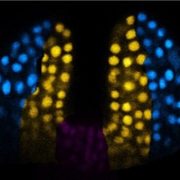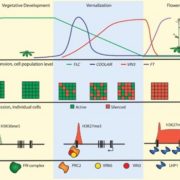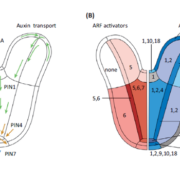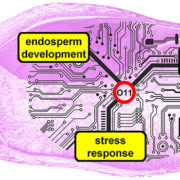Marschal Bellinger (he/him)
Marschal Bellinger (he/him) earned his doctorate in Plant Sciences from the University of California, Riverside where his research in was focused on cell shape determination in maize through live-cell imaging of microtubule organization at the cell cortex during mitosis and interphase. He grew up in the San Francisco Bay Area to avid conservationist parents and spent a lot of time as a child studying plants and animals of the California grass and marshlands. Marschal developed an interest from an early age in how traits are conserved and transferred between different species. This interest developed into a formal research project at California State University, East Bay where he studied transposable elements and their impact on gene duplication events and genome size. He continued to expand his understanding of plant genetics and cell biology in Carolyn Rasmussen’s laboratory at the University of California, Riverside by studying conserved mechanisms of plant cell division in diverse model systems that included Zea mays, Nicotiana benthamiana, and Arabidopsis thaliana. After finishing his doctoral studies at UCR, he joined Mozza Foods as a Senior Scientist. Here, he worked to engineer the next-generation plant-based bioreactors for the large-scale production of commodity proteins by developing novel plant cell culture platforms and transformation systems. Recently, he joined White Rabbit Group as a Project Manager and works with venture capital firms as a Plant Sciences Partner. In these roles, he helps to pair private funding for research with projects that translate bench science into real-world products, like vegan cheese produced in plants and made with real dairy proteins. He continues to collaborate with academic scientists on synthetic biology projects and mentors graduate students interested in pursuing private-sector plant science careers. Marschal was awarded a National Science Foundation LS-AMP fellowship and a BioCore Research Student fellowship for his work at California State University, East Bay. He received the Eugene Cota-Robles Fellowship from the University of California to study Botany and Plant Sciences at UCR and the Federal Department of Education awarded Marschal the GAANN Fellowship. At Mozza Foods, his research earned the plant biotech startup an oversubscribed seed funding round and has been included in multiple patent applications. Marschal’s record of publications includes the following:
- Cell cortex microtubules contribute to division plane positioning during telophase in maize;
- Farrow, Jeffrey & Bellinger, Marschal & Rasmussen, Carolyn. (2020). In vitro Conditions for Dark Growth and Analysis of Maize Seedlings. BIO-PROTOCOL. 10. 10.21769/BioProtoc.3555.
- Bellinger, Marschal & Sidhu, Sukhmani & Rasmussen, Carolyn. (2019). Staining Maize Epidermal Leaf Peels with Toluidine Blue O. BIO-PROTOCOL. 9. 10.21769/BioProtoc.3214.
- Rasmussen, C.G. and Bellinger, M. (2018), An overview of plant division-plane orientation. New Phytol, 219: 505-512. https://doi.org/10.1111/nph.15183
- Weiberg, A., Bellinger, M., & Jin, H. (2015). Conversations between kingdoms: small RNAs. Current opinion in biotechnology, 32, 207–215. https://doi.org/10.1016/j.copbio.2014.12.025
- Weiberg, A., Wang, M., Bellinger, M., & Jin, H. (2014). Small RNAs: a new paradigm in plant-microbe interactions. Annual review of phytopathology, 52, 495–516. https://doi.org/10.1146/annurev-phyto-102313-045933












